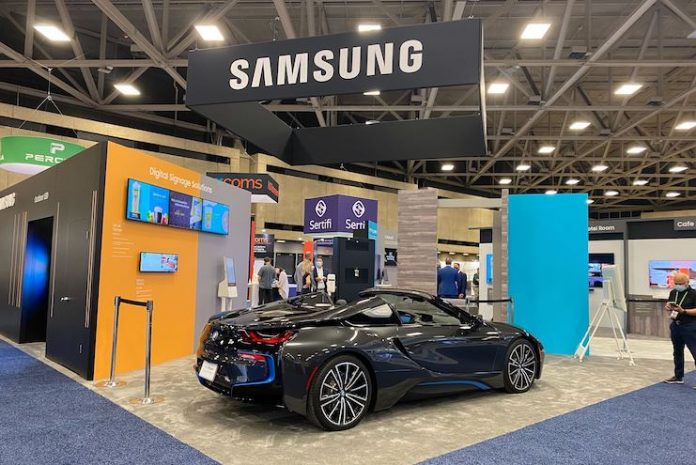While offering a literal walkthrough of his company’s products and services at HITEC Dallas 2021 at the Kay Bailey Hutchinson Convention Center, Shawn O’Connell, director, head of hospitality at Samsung Electronics, made it clear that Samsung has much more to offer these days than hardware. He showed and told LODGING then how Samsung is involved in what he calls “the entire display ecosystem,” which, in addition to the latest versions of the monitors and televisions for which they have long been known include solutions such as LYNK Cloud, a cloud-based content and device management system for guestrooms, and MagicINFO, its public-space counterpart, which allows businesses to create, schedule, and play content across a signage network, one that now includes a 292-inch micro-LED TV branded The Wall.
What’s new and exciting in hardware?
People do still tend to think of our company as television and computer monitor manufacturers—both of which remain essential to the company—but we’re actually now involved in what I call the entire display ecosystem. I’m especially excited about what we consider to be the TV of the future, the micro-LED branded The Wall for which we partnered with a company called Neo, which does digital art. They are baking their digital art ecosystem into our LED environment for use in our guestroom TV environment, as well as our public spaces. Even at the largest size, because of the way we handle the technology, it invokes a picture quality that is just unbelievable. It also offers greater longevity than the five to seven years that is typical in hospitality, where people leave their sets on longer. They are built to be used 24/7 for 10 years.
What are some of the ways Samsung products are used to support its marketing efforts?
There are, of course, the physical displays mentioned, which can integrate with our CMS or a partner system. When they use the system on chip, they don’t require an external media player, and therefore require less energy, which is important for sustainability, especially when used 24/7.
But it is the CMS platform that controls the content displayed on these sophisticated devices and offers hoteliers valuable marketing and device management information. The guestroom system, LYNK Cloud, can produce a graphical user interface that helps promote the hotel and all of its offerings; it can also analyze guests’ content use to uncover marketing insights. The public spaces version, MagicINFO, enables businesses to create, schedule, and play content across a signage network. Both allow the hotel to portray its message in line with its brand messaging; and because they are cloud-based, users can showcase content without the need for an external media player or a dedicated PC.
We also have some innovative ways of using our solutions. We are now launching an electric vehicle (EV) charging program that works with our CMS to market to customers who are charging their EVs. If done correctly by a big brand, there’s a whole guest engagement and guest loyalty opportunity in that we can market to guests or customers while they are charging—for example, by inviting them into the hotel for a piece of pie with a 10 percent off coupon. This is relevant in countless other markets—anywhere an EV can be charged.
Then, too, there is our LED digital marketing concept that uses a made-to-order 10-pixel pitch outdoor LED and is designed to be used either indoors or outdoors—in all climates. These displays are extremely durable—you can take a sledgehammer to them and they will not break, and they are also super high bright, so that content on display can be seen even in direct sunlight.
How is Samsung addressing the growing need for automation?
Even before the pandemic, a segment of the guest population was spurring the development and adoption of automation for convenience while some forward-thinking hoteliers embraced it as a way to control costs. However, it’s become a critical need since COVID called for less human contact, and the labor shortage made humans less available.
Our kiosks, which use a homegrown platform that fully integrates with all property management systems, can be used for guest check-in and check-out; it also fully integrates with point of sale systems that are relevant in the hotel market, such as grab and go type stations for food and drinks.
In what ways is Samsung responding to the different ways people have been meeting since the pandemic?
Hospitality is at its core a relationship business, so the industry wants people to collaborate eyeball to eyeball. That said, I think everyone has realized over the last year and a half through COVID that not every meeting must be face-to-face, and it makes sense to accommodate people who cannot attend meetings in person with the technology and strategies developed during this difficult time. As I see it, hybrid meetings are here to stay. Our interactive whiteboard and display products are designed to go into the meeting space as a way for consumers or guests to collaborate digitally without the use of paper.
What were some of the lessons learned from the pandemic that are informing the path ahead?
They learned that messaging, such as the need to change COVID protocols, needs to change in real-time by having control over digital endpoints. They also became increasingly aware of the role automation can play in more efficiently managing people and resources. As part of a digital transformation strategy, hoteliers need to invest in these areas the right way to respond correctly, especially during difficult times.
What should hospitality consumers know about where Samsung fits into the technology mix today?
I think the storyline here is that one size does not fit all. The hospitality market needs or has demand for every single one of our digital display endpoints; and Samsung is available to partner with them for a solution that meets their specific needs with professional services and implementation teams able to help design and implement all of our products and solutions.
[wp-video-popup autoplay=”1″ mute=”1″ video=”https://lodgingmagazine.com/wp-content/uploads/2021/09/SHO-SM-2021-September-HotelApp-1920×1080-Demo.mp4″]










